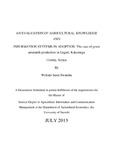| dc.contributor.author | Wekulo, SF | |
| dc.date.accessioned | 2013-07-30T08:25:53Z | |
| dc.date.available | 2013-07-30T08:25:53Z | |
| dc.date.issued | 2013 | |
| dc.identifier.citation | Wekulo Saidi Fwamba (2013). An Evaluation Of Agricultural Knowledge And Information Systems In Adoption: The Case Of Grain Amaranth Production In Lugari, Kakamega County, Kenya. Master of Science Degree in Agricultural Information and Communication Management | en |
| dc.identifier.uri | http://erepository.uonbi.ac.ke:8080/xmlui/handle/123456789/52335 | |
| dc.description.abstract | The access to agricultural information by smallholders for improved agricultural production has
increased the application of agricultural knowledge and information systems (AKIS). The
purpose of this study was to establish the factors that affect the use of AKIS tools by smallholder
grain amaranth farmers in Lugari, Kakamega County, Kenya. The AKIS tools in this study
included radio, mobile, extension agents, researchers and fanner to fanner. Using purposive
sampling, the study selected 5 villages with 131 respondents to respond to questionnaires for
data collection. Descriptive analysis was done by SPSS software while quantitative analysis was
done by STATA software.
The result;; indicate that majority of the respondents own radio (84.7%), are able to access radio
(87.8%) and are able to use radio for grain amaranth information (40.5%).84% of respondents
own mobile, 90.8% are able to access and only 64.1% use it for grain amaranth information.
78.6% of respondents are able to access extension agents but only 15.3% use them for grain
amaranth production. Researchers are only accessed by 15.3% of respondents. Farmer-farmer
communication is very effective as they access each other at 71.8% and use each other's
information at 93.9%. The findings suggest that farmer-farmer (interpersonal) communication,
FM Radio stations and cellular phones are important AKIS tools in improving small scale
agriculture in rural areas. The use of AKIS tools and socio-economic factors has significant
effect in the adoption of grain amaranth production by smallholder grain amaranth farmers.
The study recommends that the government strengthens the use of AKIS tools by restructuring
research-extension-farmer linkages and making it affordable for farmer to buy mobiles and
airtime for information sourcing. Deployment of technical extension staff should be based on
their professional training and prevailing enterprises within the localities. | en |
| dc.language.iso | en | en |
| dc.publisher | University of Nairobi | en |
| dc.title | An evaluation of agricultural knowledge and information systems In adoption: The case of grain amaranth production in Lugari, Kakamega County, Kenya | en |
| dc.type | Thesis | en |
| local.publisher | Department of Agricultural Economics | en |

